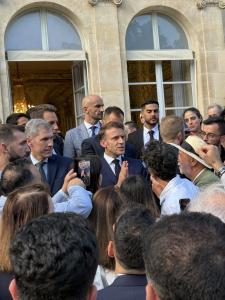Paris Call for Peace: Macron Affirms Commitment to Palestinian-Israeli Civil Society at Historic Diplomatic Convening
Macron Embraces Israeli-Palestinian Civil Society at the Elysees, Affirms Centrality
PARIS, FRANCE, June 15, 2025 /EINPresswire.com/ -- Joelle Milman - Alliance for Middle East Peace (ALLMEP)Email: joelle@allmep.org
On Friday evening, during a high-level meeting at the Palais de l'Élysée between French President Emmanuel Macron and representatives of Israeli and Palestinian civil society, attendees delivered their concerns to Macron as rocket-alert notifications buzzed on their phones when Iran launched a counterattack on Israel, striking Tel Aviv.
This convergence of violence and diplomacy was part of a historic Paris Call for Peace, hosted under the High Patronage of President Emmanuel
Macron by the Paris Peace Forum and co-organized by the Alliance for Middle East Peace (ALLMEP). The event brought together hundreds of Israeli and Palestinian peacebuilders, marketing the largest gathering of shared civil society since October 7th.
The event was held under the high patronage of President Macron and marked a key milestone in the implementation of the G7’s 2024 commitment to institutionalize support for Israeli-Palestinian civil society peacebuilding. France is the first G7 country to operationalize this commitment by formally integrating civil society into international diplomatic efforts.
President Macron, in his remarks to attendees and in a later post on X, affirmed his support for a political solution to the conflict and emphasized the central role of civil society in any lasting peace process. “If you want to stop war and dismantle the consequences of war,” he said, “you have to present, provide and implement a reasonable political hope – which is exactly two states living together, two people respecting each other, and people like you, endorsing the capacity to live with somebody with another story. This is the courage we need to build peace, and this is the courage you have.”
“The dissonance was hard to explain,” said John Lyndon, Executive Director of ALLMEP. “On the one hand, we were meeting with the French President, in his beautiful residence, hearing him speaking powerfully about the importance of this work, and its essential role in shaping a more peaceful reality. But on the other, it was one of the most dangerous nights the Middle East has seen in decades, with our members stranded in Paris, and their families– both Israeli and Palestinian– in terror, as missiles were raining down.”
Despite the escalation, conference participants finalized and presented a collective call to action. Drawing on the input of hundreds of Israeli and Palestinian peacebuilders, the statement emphasized the need for an immediate and permanent ceasefire, the release of all hostages, and the unconditional delivery of humanitarian aid at levels commensurate with the needs of Gaza’s population. It further called for mutual recognition and a renewed diplomatic process with civil society at its core, aimed at achieving a just and lasting peace.
“It has been an intense few days,” said Nivine Sandouka, ALLMEP’s Regional Director, who read the statement at the close of the event. “But as one of my colleagues said at the conference, we are condemned to hope. We’re grateful for Macron’s support of civil society, and eager to see the implementation of these ideas. If we see top-down diplomacy combined with bottom up civil society activism and action, we can help make this the last ever Israeli-Palestinian war.”
Joelle Milman
Alliance for Middle East Peace
+1 920-574-1232
email us here
Visit us on social media:
LinkedIn
Instagram
Facebook
Legal Disclaimer:
EIN Presswire provides this news content "as is" without warranty of any kind. We do not accept any responsibility or liability for the accuracy, content, images, videos, licenses, completeness, legality, or reliability of the information contained in this article. If you have any complaints or copyright issues related to this article, kindly contact the author above.
Dr. Kevin Sadati Present his Preservation Facelift Technique at Vegas Cosmetic Surgery and UC Irvine
New York Cosmos Relaunches as Fan-Owned, City-Driven Club
MRC Restoration Responds in 25 Minutes to Water Leak, Prevents Major Damage for Bonne Terre Homeowner
Kalendarium
Więcej ważnych informacji
 Jedynka Newserii
Jedynka Newserii

 Jedynka Newserii
Jedynka Newserii

Prawo

Trwają dyskusje nad kształtem unijnego budżetu na lata 2028–2034. Mogą być rozbieżności w kwestii Funduszu Spójności czy dopłat dla rolników
Trwają prace nad wieloletnimi unijnymi ramami finansowymi (WRF), które określą priorytety wydatków UE na lata 2028–2034. W maju Parlament Europejski przegłosował rezolucję w sprawie swojego stanowiska w tej sprawie. Postulaty europarlamentarzystów mają zostać uwzględnione we wniosku Komisji Europejskiej w sprawie WRF, który zostanie opublikowany w lipcu 2025 roku. Wciąż jednak nie ma zgody miedzy państwami członkowskimi, m.in. w zakresie Funduszu Spójności czy budżetu na rolnictwo.
Konsument
35 proc. gospodarstw domowych nie stać na zakup mieszkania nawet na kredyt. Pomóc może wsparcie budownictwa społecznego i uwolnienie gruntów pod zabudowę

W Polsce co roku oddaje się do użytku ok. 200 tys. mieszkań, co oznacza, że w ciągu dekady teoretycznie potrzeby mieszkaniowe społeczeństwa mogłyby zostać zaspokojone. Jednak większość lokali budują deweloperzy na sprzedaż, a 35 proc. gospodarstw domowych nie stać na zakup nawet za pomocą kredytu. Jednocześnie ta grupa zarabia za dużo, by korzystać z mieszkania socjalnego i komunalnego. Zdaniem prof. Bartłomieja Marony z UEK zmniejszeniu skali problemu zaradzić może wyłącznie większa skala budownictwa społecznego zamiast wspierania kolejnymi programami zaciągania kredytów.
Problemy społeczne
Hejt w sieci dotyka coraz więcej dzieci w wieku szkolnym. Rzadko mówią o tym dorosłym

Coraz większa grupa dzieci zaczyna korzystać z internetu już w wieku siedmiu–ośmiu lat – wynika z raportu NASK „Nastolatki 3.0”. Wtedy też stykają się po raz pierwszy z hejtem, którego jest coraz więcej w mediach społecznościowych. Według raportu NASK ponad 2/3 młodych internautów uważa, że mowa nienawiści jest największym problemem w sieci. Co więcej, dzieci rzadko mówią o takich incydentach dorosłym, dlatego tym istotniejsze są narzędzia technologiczne służące ochronie najmłodszych.
Partner serwisu
Szkolenia

Akademia Newserii
Akademia Newserii to projekt, w ramach którego najlepsi polscy dziennikarze biznesowi, giełdowi oraz lifestylowi, a także szkoleniowcy z wieloletnim doświadczeniem dzielą się swoją wiedzą nt. pracy z mediami.









.gif)

 |
| |
| |
|